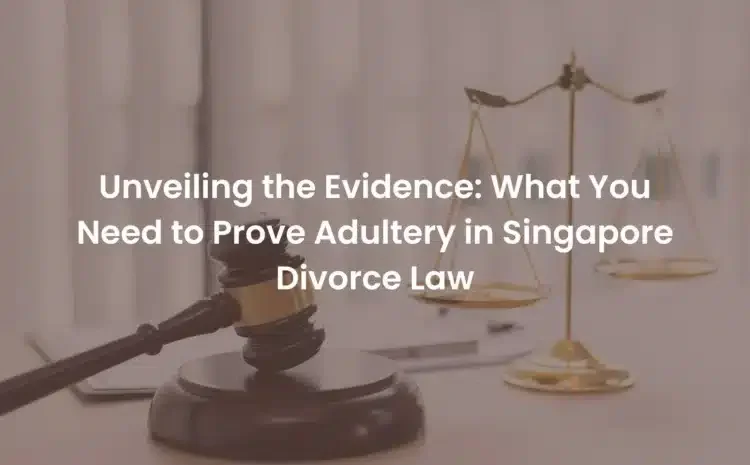Unveiling the Evidence: What You Need to Prove Adultery in Singapore Divorce Law
Adultery is a sensitive subject, particularly when it comes to legal proceedings such as divorce. In Singapore, where family values and social norms are deeply ingrained, understanding the evidence required to prove adultery in divorce cases is essential for anyone contemplating or navigating the dissolution of a marriage. In this blog post, we’ll explore the intricacies of gathering evidence for adultery in Singapore divorce law and shed light on what constitutes sufficient proof in the eyes of the court.
Understanding Adultery in Singapore Divorce Law
Under the Women’s Charter of Singapore, adultery is one of the fault-based grounds for divorce. It is defined as voluntary sexual intercourse between a married person and someone who is not their spouse. However, proving adultery in court requires more than just allegations. The burden of proof lies with the accusing spouse, and they must present credible evidence to substantiate their claims.
Types of Evidence
Direct Evidence: Direct evidence of adultery includes eyewitness accounts or admissions from the adulterous spouse themselves. Witness testimony can be compelling, especially if it comes from someone who has firsthand knowledge of the affair. However, direct evidence is not always readily available or easy to obtain.
Circumstantial Evidence: In many cases, adultery is proven through circumstantial evidence, which indirectly suggests that the affair took place. This can include items such as hotel receipts, text messages, emails, or social media interactions that imply an extramarital relationship. While circumstantial evidence may not definitively prove adultery on its own, it can be persuasive when presented alongside other supporting evidence.
Private Investigator Reports: Some spouses may enlist the services of a private investigator to gather evidence of adultery. Private investigators can conduct surveillance, gather photographic or video evidence, and compile detailed reports documenting the suspected affair. However, it’s essential to ensure that any evidence obtained through private investigators complies with legal standards and is admissible in court.
Admissions and Confessions: In some cases, the adulterous spouse may admit to the affair either privately or in written correspondence. Admissions or confessions can serve as powerful evidence of adultery, especially if they are voluntary and made without coercion.
Legal Considerations
It’s important to note that not all evidence of suspicious behavior or infidelity will be sufficient to prove adultery in court. The evidence must be credible, relevant, and admissible under Singapore law. Additionally, the court will consider the totality of the evidence presented and assess its reliability and authenticity before making a determination.
Conclusion
Proving adultery in Singapore divorce law requires careful consideration and gathering of evidence. Whether through direct testimony, circumstantial evidence, private investigator reports, or admissions from the adulterous spouse, presenting credible evidence is crucial for a successful outcome in divorce proceedings. However, navigating the complexities of evidence gathering and ensuring compliance with legal standards may require the assistance of experienced legal professionals. Ultimately, the goal should be to present a compelling case that persuades the court of the occurrence of adultery and its impact on the marriage.

